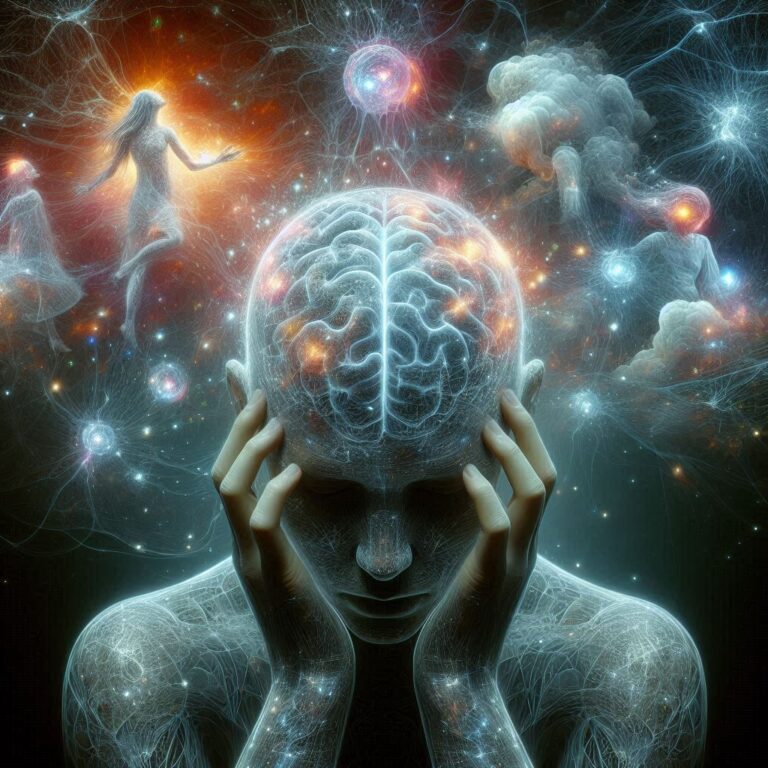The Spiritual Meaning of Insomnia: Why You Can’t Sleep
Do you find yourself staring at the ceiling most nights? Do anxious thoughts or strong emotions keep your mind too active to fall asleep? You’re not alone. Many people struggle with insomnia. But sleep difficulties may hint at deeper issues. Discover the spiritual reasons your sleep suffers and simple ways to invite rest.
Here’s a quick interpretation:
Insomnia often relates to energetic, emotional, or spiritual imbalance. An overactive nervous system, trapped grief, anger issues, perfectionism, or avoiding unresolved feelings can manifest as sleep struggles. Tuning into the root causes and addressing them with mindfulness, embodiment practices, energy work, or professional support can help restore healthy rest.

When an Overactive Mind Disrupts Slumber
The most obvious trigger for insomnia is an overstimulated nervous system. As you lie there with your thoughts racing, your body remains on high alert. This convinces your brain it’s not safe to drift off.
You likely recognize this pattern. No matter how exhausted your body feels, you can’t stop obsessing over problems or stressful situations. Ask yourself whether any of this resonates:
- You stay up late compulsively checking emails or social media even when you want sleep.
- You feel tense and have difficulty unwinding no matter your pre-bed routine.
- Your thoughts keep circling problems without solutions.
When nervous system activation blocks sleep, it often links to perceived stresses. Your system flood with stress hormones, interrupting natural cycles. Begin addressing this by evaluating and reducing stressors. Easy places to start include:
- Set boundaries: Don’t overcommit yourself. Learn to say no.
- Unplug: Limit screen time and news consumption.
- Get organized: Reduce clutter and unfinished tasks that drain mental energy.
After lowering external stresses, purposely cultivate calm. for your sleep sanctuary. Follow a consistent bedtime routine that shifts your focus inward. Ideas might include:
- Taking a warm bath or shower
- Sipping herbal tea
- Lighting a calming candle
- Reading an uplifting book
- Trying relaxing yoga poses
- Listening to peaceful music
- Practicing deep breathing
These soothing rituals prime your body for rest. As you establish healthy sleep habits, insomnia wanes.
Revealing Organ Energy Imbalances
In Chinese medicine, they associate each organ network with specific hours. So if you regularly wake during particular times, the related meridian may need support. Here are common intervals with linked emotional and physical themes:
11 pm – 1 am = Gallbladder
The gallbladder channels passion, courage, and decisiveness. Disruptions can cause indecision and self-doubt.
1 am – 3 am = Liver
As the body’s filter, the liver processes toxins and anger. Imbalances show as resentment or frequent irritation.
3 am to 5 am = Lungs
The lungs oxygenate us through breathing. Grief and disconnection from life or inspiration often underlie lung issues.
5 am to 7 am = Large Intestine
The large intestine eliminates waste. Awakening during these hours may indicate a backlog of unresolved emotional crap needing release.
Tune into body signals if you consistently wake in particular windows. Then utilize balancing techniques:
| Meridian | Solution Ideas |
|---|---|
| Gallbladder | Embrace decisiveness. Release perfectionism and self-judgment. |
| Liver | Practice loving-kindness and radical forgiveness. |
| Lungs | Deepen inspirational connections through nature, music, poetry, etc. Cry, sing out emotions. |
| Large Intestine | Declutter possessions and relationships. Cleanse unhelpful thought patterns and beliefs. |
By smoothing blocked energies, you welcome deeper healing slumber.
Processing Avoid Emotions
Paradoxically, all the thinking you do in bed often prevents solutions. Constant analysis tricks your mind into believing it solves problems. But did you know thoughts frequently mask trapped emotions needing release?
Next time insomnia hits, shift attention from busy thoughts to physical sensations. Don’t judge what you notice or try to fix anything. Simply breathe into tense areas and let emotions flow through you.
This mindful embodiment practice has profound impacts. Researchers confirm consciously feeling emotions transforms related brain networks. As you welcome all your feelings, they integrate rather than manifesting as sleeplessness or discontent.
Moreover, bynot avoiding difficult emotions you build emotional resilience. Events in life will trigger upset. But when you regularly process feelings, you prevent emotional backlogs. Try these tips:
- Feel it: Welcome frustration, anger, grief, etc without reacting.
- Breathe into it: Send breath’s calming effects to tense spaces.
- Be with it: Don’t need to analyze meanings or solutions. Just be.
- Let it move: Emotions pass quicker if you don’t cling, suppress or judge.
Keep reminding yourself of the wisdom in sleep, dreams and unconsciousness. What your conscious mind avoids, dreams often process for you. The phases of sleep balance and restore you holistically. So embrace rest as a spiritual practice!
Inviting Meaningful Rest
In the end, insomnia indicates energetic, emotional or spiritual imbalance. Fortunately when you compassionately listen to its causes, harmony returns. Quiet worry-mind with mindfulness. Release stored tensions through feeling. And most importantly, trust your inner healer by receiving adequate restorative rest. Sweet dreams!
FAQ
What are some common spiritual reasons for insomnia?
Some potential spiritual contributors to insomnia include an overactive mind or nervous system, imbalanced organ energy according to Chinese medicine, avoiding emotions that need processing, and disconnection from one’s inner wisdom.
What time of night is associated with the lungs and grief?
In Chinese medicine philosophy, the hours between 3am and 5am correspond to the lung meridian. Since the lungs oxygenate us through breath, blocked lung energy can reflect suppressed grief or loss of inspiration.
If I wake up at 2am every night, what organ meridian is potentially out of balance?
According to the Chinese body clock system, the liver meridian is most active between 1am and 3am. Since the liver filters toxins and stores unprocessed anger, frequent waking around 2am may indicate pent-up frustration or resentment needing release.
What are some examples of bedtime routines that can help with insomnia?
Soothing pre-sleep rituals to calm the nervous system may include taking a warm bath, drinking herbal tea, reading an uplifting book, listening to peaceful music, meditating, trying relaxing yoga poses, writing in a gratitude journal, and practicing deep breathing.
Why is processing emotions important for addressing insomnia?
Bottling up emotions often translates into a racing mind and physical tension that disrupt sleep. By welcoming and moving through all feelings – rather than avoiding or suppressing them – you allow integration so they no longer manifest as insomnia or other imbalances.






